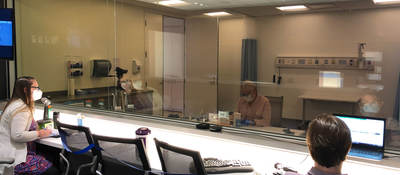December 17, 2020
As governments, industry and other entities begin COVID-19 vaccine distribution efforts worldwide, cold chain management has emerged as a crucial factor for ensuring vaccine safety and effectiveness.
Cold chain management entails maintenance of necessary refrigeration levels for highly temperature-sensitive coronavirus vaccines across manufacturing, storage, transportation and distribution processes. Effective vaccine cold chain management will require varying degrees of coordination and cooperation among multiple, distinct stakeholders:
- Pharmaceutical manufacturers
- Specialized laboratory equipment manufacturers (temperature gauges, senor devices, hospital-grade freezers)
- Laboratory equipment manufacturers that produce climate-controlled packaging and container materials
- Logistics providers
- Healthcare providers and point-of-care (POC) retail pharmacies
Effective cold chain management involves ensuring not only that temperatures to maintain vaccine viability are held constant, but also that adequate technologies are in place to allow stakeholders at various points in vaccine storage, transport and distribution chains to verify stability of required temperatures. These track-and-trace technologies furthermore introduce the need for robust cybersecurity measures, underscored by IBM’s recent warnings that cold chain processes have already become hacking targets.
Below, Emergo by UL will discuss general parameters and considerations for cold chain processes, as well as how cold chain management may affect stakeholders’ needs for quality management and assurance, cybersecurity risk management, human factors engineering and related support. Some aspects of the COVID-19 vaccine cold chain can be supported by existing guidelines, regulations, standards and third-party services; for other aspects, new or modified service and support approaches will be necessary.
Regulatory and market access requirements
Vaccine cold chain management comprises a patchwork of processes, methods and practices across several industries; these processes, in turn, have their own safety and performance standards as well as national (and in some cases international) regulations to which they comply and/or demonstrate conformity.
Regulators in the US, European Union, China and other markets have requirements in place for pieces of the cold chain process, but not for the entire process. Manufacturers of pharmaceutical products, medical-grade freezers and laboratory equipment must comply with safety, quality and performance requirements established by the US Food and Drug Administration and other regulators, for example.
Cold chain stakeholders will need to continue their compliance regimens according to their applicable industry regulations, and maintain or establish third-party advisory partnerships as necessary to support ongoing commercialization in their chosen markets.
Cold chain risk management
Risk management approaches for effective vaccine cold chain efforts should entail rigorous gap assessments focused particularly on real-time process audits for two areas: Chain of Custody for tracking and documenting cold chain materials through storage, transportation and distribution; and Chain of Conditions for supporting consistent temperatures as vaccines are transported.
Labeling, IFU and usability considerations
Cold chain stakeholders should pay careful attention to labeling and safe handling instructions and verify that these materials clearly articulate storage requirements, expiration data and transport requirements for non-experts.
Human factors engineering and usability considerations come heavily into play at the end of the cold chain, where healthcare providers and POC retailers administer and dispense vaccines to patients. These stakeholders should follow appropriate HFE and usability practices and be equipped with clear indications for use (IFU) for vaccine dosage.
Cybersecurity: Vulnerability assessments
As we mentioned in the introduction of this post, cybersecurity risk management is a key factor for effective cold chain management. On their own or with capable third-party auditors, stakeholders should conduct cybersecurity vulnerability assessments not only to identify their own internal vulnerabilities but also to evaluate partners in their supply chains. In some cases, companies may apply existing cybersecurity frameworks. Disaster recovery planning as well as supplier control planning should also be included in stakeholders’ cold chain cybersecurity approaches.
Following their initial vulnerability assessments, stakeholders should evaluate and implement best practices for digital health and cybersecurity, including IoT security ratings for connected devices and encryption policies.
Best practices for vaccine transport and receiving
Finally, for healthcare providers and POC retail pharmacies develop their own “playbooks” covering transportation, receiving and storage of vaccines before administration to patients, these stakeholders may require third-party support in terms of auditing and gap analysis to demonstrate that their processes include proper temperature maintenance and incorporate applicable best practices. Playbook reviews provide an important assurance tool for stakeholders taking a more in-house approach to cold chain management.
Conclusion: An evolving process
As COVID-19 cold chain efforts ramp up, companies will soon enough be able to determine which processes work well and which will require new or significantly changed approaches in terms of both internal capabilities as well as third-party products and services. Emergo by UL regulatory affairs and quality management experts will be closely monitoring these efforts to provide effective and responsive support to healthcare and related stakeholders.
Questions? Request more information from our specialists
Thanks for your interest in our products and services. Let's collect some information so we can connect you with the right person.







